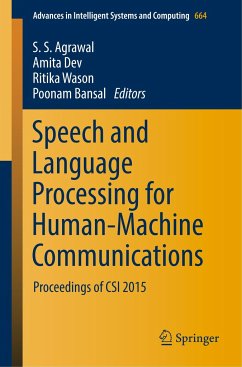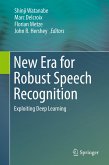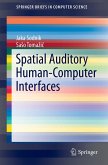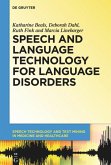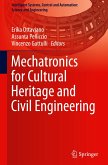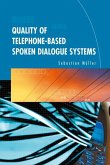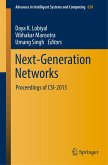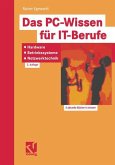Speech and Language Processing for Human-Machine Communications
Proceedings of CSI 2015
Herausgegeben:Agrawal, S. S.; Devi, Amita; Wason, Ritika; Bansal, Poonam
Speech and Language Processing for Human-Machine Communications
Proceedings of CSI 2015
Herausgegeben:Agrawal, S. S.; Devi, Amita; Wason, Ritika; Bansal, Poonam
- Broschiertes Buch
- Merkliste
- Auf die Merkliste
- Bewerten Bewerten
- Teilen
- Produkt teilen
- Produkterinnerung
- Produkterinnerung
This volume comprises the select proceedings of the annual convention of the Computer Society of India. Divided into 10 topical volumes, the proceedings present papers on state-of-the-art research, surveys, and succinct reviews. The volumes cover diverse topics ranging from communications networks to big data analytics, and from system architecture to cyber security. This volume focuses on Speech and Language Processing for Human-Machine Communications. The contents of this book will be useful to researchers and students alike.
Andere Kunden interessierten sich auch für
![New Era for Robust Speech Recognition New Era for Robust Speech Recognition]() New Era for Robust Speech Recognition131,99 €
New Era for Robust Speech Recognition131,99 €![Spatial Auditory Human-Computer Interfaces Spatial Auditory Human-Computer Interfaces]() Jaka SodnikSpatial Auditory Human-Computer Interfaces40,99 €
Jaka SodnikSpatial Auditory Human-Computer Interfaces40,99 €![Speech and Language Technology for Language Disorders Speech and Language Technology for Language Disorders]() Katharine BealsSpeech and Language Technology for Language Disorders59,99 €
Katharine BealsSpeech and Language Technology for Language Disorders59,99 €![Mechatronics for Cultural Heritage and Civil Engineering Mechatronics for Cultural Heritage and Civil Engineering]() Mechatronics for Cultural Heritage and Civil Engineering123,99 €
Mechatronics for Cultural Heritage and Civil Engineering123,99 €![Quality of Telephone-Based Spoken Dialogue Systems Quality of Telephone-Based Spoken Dialogue Systems]() Sebastian MöllerQuality of Telephone-Based Spoken Dialogue Systems121,99 €
Sebastian MöllerQuality of Telephone-Based Spoken Dialogue Systems121,99 €![Next-Generation Networks Next-Generation Networks]() Next-Generation Networks77,99 €
Next-Generation Networks77,99 €![Das PC-Wissen für IT-Berufe: Hardware, Betriebssysteme, Netzwerktechnik Das PC-Wissen für IT-Berufe: Hardware, Betriebssysteme, Netzwerktechnik]() Rainer EgewardtDas PC-Wissen für IT-Berufe: Hardware, Betriebssysteme, Netzwerktechnik79,99 €
Rainer EgewardtDas PC-Wissen für IT-Berufe: Hardware, Betriebssysteme, Netzwerktechnik79,99 €-
-
-
This volume comprises the select proceedings of the annual convention of the Computer Society of India. Divided into 10 topical volumes, the proceedings present papers on state-of-the-art research, surveys, and succinct reviews. The volumes cover diverse topics ranging from communications networks to big data analytics, and from system architecture to cyber security. This volume focuses on Speech and Language Processing for Human-Machine Communications. The contents of this book will be useful to researchers and students alike.
Produktdetails
- Produktdetails
- Advances in Intelligent Systems and Computing 664
- Verlag: Springer / Springer Nature Singapore / Springer, Berlin
- Artikelnr. des Verlages: 978-981-10-6625-2
- 1st ed. 2018
- Seitenzahl: 232
- Erscheinungstermin: 16. November 2017
- Englisch
- Abmessung: 235mm x 155mm x 13mm
- Gewicht: 370g
- ISBN-13: 9789811066252
- ISBN-10: 9811066256
- Artikelnr.: 48921460
- Herstellerkennzeichnung Die Herstellerinformationen sind derzeit nicht verfügbar.
- Advances in Intelligent Systems and Computing 664
- Verlag: Springer / Springer Nature Singapore / Springer, Berlin
- Artikelnr. des Verlages: 978-981-10-6625-2
- 1st ed. 2018
- Seitenzahl: 232
- Erscheinungstermin: 16. November 2017
- Englisch
- Abmessung: 235mm x 155mm x 13mm
- Gewicht: 370g
- ISBN-13: 9789811066252
- ISBN-10: 9811066256
- Artikelnr.: 48921460
- Herstellerkennzeichnung Die Herstellerinformationen sind derzeit nicht verfügbar.
Dr. Shyam Sunder Agrawal is a World-renowned scientist and a teacher in the area of Acoustic Speech and Communication. He obtained his Ph.D in 1970 from the Aligarh Muslim University, India. He is having a research experience of about 45 years at the Central Electronics Engineering Research Institute (CEERI), Pilani and subsequently as Emeritus Scientist of The Council of Scientific & Industrial Research (CSIR), and as Advisor to the Centre for Development of Advanced Computing (CDAC), Noida. He was a Guest Researcher at the Massachusetts Institute of Technology (MIT), Ohio State University and University of California, Los Angeles (UCLA) in USA. His major areas of interest are Spoken Language Processing and Development of Speech Databases and has steered many National and International projects. He has published a large number of papers, guided many Ph.D students and received Honours and Awards in India and abroad. He is currently working as the Director General of the KIIT Group of Colleges, Gurgaon, Haryana. Dr. (Mrs.) Amita Dev obtained her B.Tech degree from Panjab University, Chandigarh and completed her postgraduation from the Birla Institute of Technology and Science (BITS), Pilani, India. She obtained her Ph.D degree from the Delhi College of Engineering under University of Delhi in the area of Computer Science. She is a Fellow of the Institution of Electronics and Telecommunication Engineers (IETE), a Life Member of the Indian Society for Technical Education (ISTE) and Computer Society of India (CSI). She has more than 30 years of experience and is presently working as thea Principal of the Ambedkar Institute of Technology, Delhi and Bhai Parmanand Institute of Business Studies, Delhi under the Department of Training and Technical Education, Government of Nation al Capi tal Terri tory of Delhi (NCT). She has been awarded the "National Level Best Engineering Teachers Award" in the year 2001 by the ISTE for her significant contribution in the field of Engineering and Technology. She has also been awarded the "State Level Best Teacher Award" by the Department of Training and Technical Education, Government of NCT of Delhi. She is the recipient of the "National Level Young Teachers Award" for pursuing advance research in the field of Speech Recognition. She has published more than 45 papers in leading National and International Journals and in the Conference Proceedings of leading conferences. She has written several books in the area of Computer Science and Engineering. Mrs. Ritika Wason has completed her postgraduation from IPU (Indraprashtha University, now Guru Gobind Singh Indraprastha University) and has submitted her Ph.D in Computer S cience to the Sh arda University, Delhi. She is a Life Member of the Indian Society for Technical Education (ISTE) and Computer Society of India (CSI). She has more than 8 years of experience and is presently working as an Assistant Professor, at BharatiVidyapeeth's Institute of Computer Applications and Management (BVICAM), New Delhi. She has published more than 15 papers in leading National and International Journals and in the Conference Proceedings of leading conferences. She has also authored several books in the area of Computer Science and Engineering. Prof. Poonam Bansal is the Acting Director of the Maharaja Surajmal Institute of Technology (MSIT), a prestigious institute affiliated to the Guru Gobind Singh Indraprastha University (GGSIP University), New Delhi. She has 24 years of wide and rich experience in Industry, Teaching and Research. She received her B.Tech. and M.Tech. D egrees from the Delhi College of Engineering, Delhi and Ph.D from the GGSIPU, New Delhi. She has published more than 25 research papers in peer-reviewed journals and conferences of National and International repute. Her areas of interest include Speech Technology, Soft Computing and Computer Networking. & lt; /p>
AC: An Audio Classifier to Classify Violent Extensive Audios.- Document-to-Sentence Level Technique for Novelty Detection.- Continuous Hindi Speech Recognition in Real Time Using NI LabVIEW.- Gujarati Braille Text Recognition: A Design Approach.- Development of Embedded Platform for Sanskrit Grammar-Based Document Summarization.- Approach for Information Retrieval by Using Self Organizing Map and Crisp Set.- An Automatic Spontaneous Speech Recognition System for Punjabi Language.- A System for the Conversion of Digital Gujarati Text to Speech for Visually Impaired People.- Hidden Markov Model for Speech Recognition System- A Pilot Study and a Naive Approach for Speech-to-Text Model.- Speaker Independent Recognition System for Continuous Hindi Speech Using Probabilistic Model.- A Robust Technique for Handwritten Words Segmentation into Individual Characters.- Developing Speech-Based Web Browsers for Visually Impaired Users.- Adaptive Infrared Images Enhancement Using Fuzzy Based Concepts.- Towards Machine Translation Linguistic Issues of Indian Sign Language.- Analysis of Emotion Recognition System for Telugu Using Prosodic and Formant Features.- Simple Term Filtering for Location-Based Tweets Classification.- Security Analysis of Scalable Speech Coders.- Issues in i-vector modeling: An analysis of total variability space and UBM size.- Acoustic Representation of Monophthongs with Special Reference to Bodo Language.- Detection of Human Emotion from Speech - Tools and Techniques.- Phonetic Transcription Comparison for Emotional Database for Speech Synthesis.- The State-of-the-Art of Feature Extraction Techniques in Speech Recognition.- Challenges and Issues in Adopting Speech Recognition.
AC: An Audio Classifier to Classify Violent Extensive Audios.- Document-to-Sentence Level Technique for Novelty Detection.- Continuous Hindi Speech Recognition in Real Time Using NI LabVIEW.- Gujarati Braille Text Recognition: A Design Approach.- Development of Embedded Platform for Sanskrit Grammar-Based Document Summarization.- Approach for Information Retrieval by Using Self Organizing Map and Crisp Set.- An Automatic Spontaneous Speech Recognition System for Punjabi Language.- A System for the Conversion of Digital Gujarati Text to Speech for Visually Impaired People.- Hidden Markov Model for Speech Recognition System- A Pilot Study and a Naive Approach for Speech-to-Text Model.- Speaker Independent Recognition System for Continuous Hindi Speech Using Probabilistic Model.- A Robust Technique for Handwritten Words Segmentation into Individual Characters.- Developing Speech-Based Web Browsers for Visually Impaired Users.- Adaptive Infrared Images Enhancement Using Fuzzy Based Concepts.- Towards Machine Translation Linguistic Issues of Indian Sign Language.- Analysis of Emotion Recognition System for Telugu Using Prosodic and Formant Features.- Simple Term Filtering for Location-Based Tweets Classification.- Security Analysis of Scalable Speech Coders.- Issues in i-vector modeling: An analysis of total variability space and UBM size.- Acoustic Representation of Monophthongs with Special Reference to Bodo Language.- Detection of Human Emotion from Speech - Tools and Techniques.- Phonetic Transcription Comparison for Emotional Database for Speech Synthesis.- The State-of-the-Art of Feature Extraction Techniques in Speech Recognition.- Challenges and Issues in Adopting Speech Recognition.

